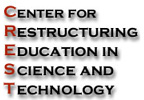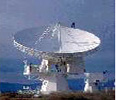|
 |
|||
| Physical Science | ||||
|
The Physical Science standards builds upon the skills of systematic investigation with a focus on variables and repeated trails. By using evidence and data students validate conclusions. Students plan and conduct research involving both classroom experimentation and literature reviews. There is a more in-depth understanding of the nature and stucture of matter and the characteristics of energy. Emphasize is placed on physical science principles. The areas covered include periodic table, physical and chemical changes, nuclear reactions, temperature and heat; sound; light; electricity and magnetism; and work, force, and motion. Adventures of Echo the Bat: Electromagnetic Spectrum A story about a bat that demonstrates theory of electromagnetic spectrum and remote sensing. Excellent details to explainations and wonderful graphics and images. Consumer Energy Information: Energy Efficiency and Renewable Energy Network Supported by the Department of Energy discusses the importance of being energy efficient. Provides access to Ask an Energy Expert and links to Energy Information Adminstration Kids page that explains energy sources and directs to online Energy Education Resources. Features The Energy Story a guide about energy highlighting such topics as what is energy, fission and fusion as well as electricity transmission. Discusses energy safety, directs you to super scientists in the field of physical science, Poor Richard's Energy Almanac, and you can Ask Dr. Questor questions on topics from general energy to transportation energy. Highlights include an energy unit glossary, energy scapbook, and Ask Arthur, an expert on geothermal energy. Has excellent links to other geothermal resources. Features nine ways to learn about fusion energy: An Internet Plasma Physics EXperience which includes links on matter, electricity, magnetism, energy, and fusion. General Atomics Fusion Groups Educational Home Page Explains the fusion process, provides a fusion glossary and links to web sites with information on high temperature fusion Gpukids: Postive Energy Begins with Me! Features energy-related games, activities, experiments, electrical safety, energy conservation and environment-related topics. The IPPEX Development Team: Interactive Physics Modules A series of interactive pages that use shockwave that cover matter, electricity, energy, and fusion. A fusion data analysis lets you view and analyze real data from the Tokamak Fusion Test Reactor. National Institute of Standards and Technology: Physics Laboratory One of the major operating units of the NIST the Physics Laboratory supports US industry by providing measurement services and research for electronic, optical, and radiation technologies with links to physical reference data constants, units & uncertainty and measurements and calibrations. General Interest section includes information about Marie Curie and the NBS Radium Standards. Periodic Tables: A Variety of Periodic Tables More than 30 links to a variety of periodic tables including instant facts and figures for every element, color-coded by date of discovery, with atomic structure, isotopes, and masses, large, colorful, and concise rendering and much more... Quick overview of topics focus on light, motion, electricity. Allows users to test knowledge with quiz. |
CREST
Home Physics Chemistry Biology Earth Science Physical Science Life Science Grades 4 - 6 Education Resources Technology Vendors Science Organizations Contact Information VA Science SOL Search Engine for Children |
 |


